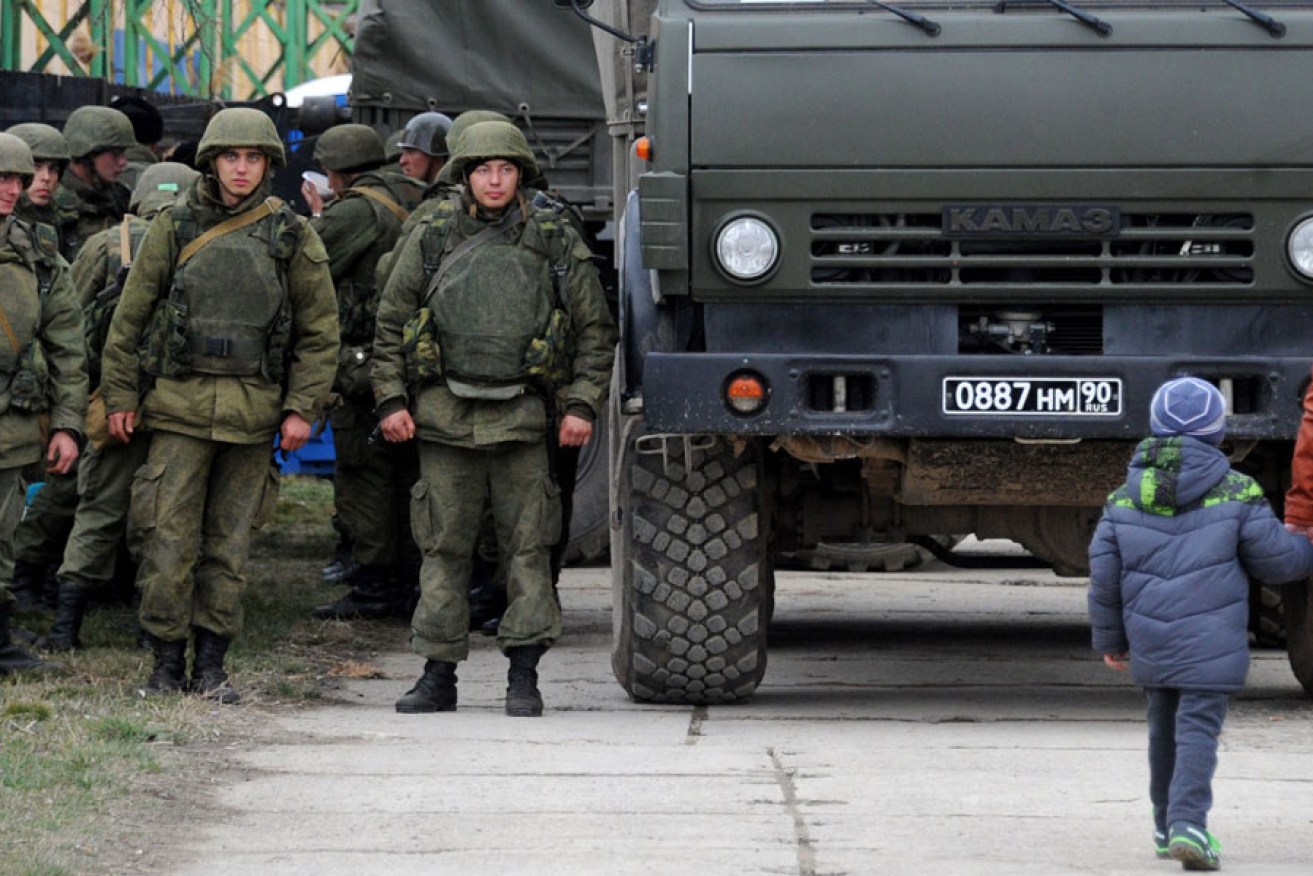The federal government has summoned the Russian ambassador to explain his country’s actions in the Ukraine.
Foreign Minister Julie Bishop says the secretary of her department, Peter Varghese, will meet with ambassador Vladimir Morozov later on Monday.
“We’ll express our concerns officially, directly through him and also seek to ascertain exactly what the Russian government thinks it’s doing,” Bishop told ABC radio.
Asked if the government is considering expelling the envoy, Bishop said: “Well, first thing’s first.”
Ukraine has warned it’s on the brink of disaster and called up all military reservists after Russia threatened to invade.
Russia’s parliament voted on the weekend to allow Russian President Vladimir Putin to send troops into the country following weeks of civil unrest.
Bishop called the developments deeply concerning, saying both military activity and tensions were clearly escalating.
“The way to resolve it is for Russia to withdraw its forces,” she said.
Bishop says Australia is using its temporary seat on the United Nations Security Council to urge a peaceful resolution to the crisis.
“We’ve made it clear that we unequivocally support the territorial integrity and sovereignty of Ukraine,” she said. “It is unacceptable for Russia or any other nation to threaten it.”
She says Australians in the Ukraine and Crimea should leave if they can.
Meanwhile, Ukraine’s navy chief has switched allegiance to the pro-Russian authorities of the flashpoint peninsula of Crimea, a day after he was appointed to the post by interim leader Oleksandr Turchynov.
“I swear to execute the orders of the (pro-Russia) commander-in-chief of the Autonomous Republic of Crimea,” Denis Berezovsky said in a televised statement from inside the Crimean headquarters of the Russian Black Sea Fleet, adding that he “swears allegiance to the residents of the Autonomous Republic of Crimea”.
The seismic declaration came as the Kiev authorities appeared to be losing control of the Russian-speaking Crimea peninsula, which has plunged further and further into disarray since the ouster of Kremlin-backed president Viktor Yanukovych last weekend.
Armed men that Kiev believes are backed by Moscow have since seized key government buildings in the region and surrounded Ukrainian military bases, and Russia’s parliament on Saturday approved the deployment of troops into the country.
It is unclear why and how Berezovsky switched his allegiance, but Crimea’s newly appointed pro-Russia prime minister Sergiy Aksyonov, who is not recognised by Kiev, said the announcement was a “historic event” at a joint press conference with the navy chief.
UKRAINE: THE KEY FACTS
GEOGRAPHY: Ukraine lies in eastern Europe and is sandwiched between ex-Soviet Belarus, Moldova and Russia and EU members Hungary, Poland, Romania and Slovakia.
It covers 603,700 square kilometres, and is the second largest country in Europe after Russia.
POPULATION: 45.6 million in 2012 (World Bank). Russians make up the largest minority.
HISTORY: Much of modern-day Ukraine was part of the former Russian empire although its northwest belonged to the Austro-Hungarian empire. After the Russian revolution, Ukraine became part of the USSR.
Growing opposition to Soviet rule culminated in the declaration of independence on August 24, 1991, confirmed by referendum on December 1.
The world’s worst civilian nuclear accident took place in Ukraine on April 26, 1986, at the Chernobyl nuclear power station. Thirty people were killed in an explosion and a further 2500 died of related illnesses. The reactor was closed in 2000.
POLITICAL SITUATION: A 2004 election pitted pro-Western Viktor Yushchenko against pro-Russian Viktor Yanukovych. After official results showed Yanukovych had won, Yushchenko launched mass protests, claiming the election was rigged.
The supreme court agreed and ordered a re-run ballot on December 26, 2004, which Yushchenko won amidst what became known as the Orange Revolution.
But amid huge disappointment with the results of the revolution, Yushchenko was bundled out of the 2010 vote in the first round by Yanukovych, who went on to win against prime minister Yulia Tymoshenko. She was later sentenced to seven years in prison for abuse of power in connection with Russian gas contracts.
In December, protesters angry at Ukraine’s decision to suspend partnership talks with the European Union launched a movement of mass protests, which culminated in February with the ouster of Yanukovych.
As the president fled, Tymoshenko walked free on February 22 and her right-hand man Oleksandr Turchynov was designated interim leader ahead of early elections set for May 25.
ECONOMY: In 2013 Ukraine faced an economic crisis and is teetering on the brink of bankruptcy, according to analysts. Gas has been a bone of contention between Russia, which provides 60 per cent of Ukraine’s needs, and Ukraine which is the main transit country for gas exported to the EU.
In December, Yanukovych secured a $US15 billion ($A16.80 billion) bailout deal from Moscow, and a huge price cut for Russian gas. But Moscow cancelled that deal after only $US3 billion had been disbursed, following the overthrow of Yanukovych.
International lenders are currently in talks to muster a financial rescue worth some $US15 billion for the country, which has little cash in its coffers and dwindling foreign exchange reserves.





